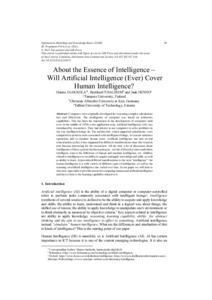About the Essence of Intelligence - Will Artificial Intelligence (Ever) Cover Human Intelligence?
Jaakkola, Hannu; Thalheim, Bernhard; Henno, Jaak (2022)
Jaakkola, Hannu
Thalheim, Bernhard
Henno, Jaak
Teoksen toimittaja(t)
Tropmann-Frick, Marina
Jaakkola, Hannu
Thalheim, Bernhard
Kiyoki, Yasushi
Yoshida, Naofumi
IOS Press
2022
Julkaisun pysyvä osoite on
https://urn.fi/URN:NBN:fi:tuni-202202222080
https://urn.fi/URN:NBN:fi:tuni-202202222080
Kuvaus
Peer reviewed
Tiivistelmä
Computers were originally developed for executing complex calculations fast and effectively. The intelligence of computer was based on arithmetic capabilities. This has been the mainstream in the development of computers until now. In the middle of 1950s a new application area, Artificial Intelligence (AI), was introduced by researchers. They had interest to use computers to solve problems in the way intelligent beings do. The architecture, which supported calculations, were conquered to perform tasks associated with intelligence beings, to execute inference operations and to simulate human sense. Artificial intelligence has had several reincarnation cycles; it has reappeared in different manifestations since this research area became interesting for the researchers. All the time a lot of discussion about intelligence of these systems has been going on - are the AI based systems and robots intelligent, what is the difference of human and machine intelligence, etc. Abilities related to intelligence cover ability to acquire and apply knowledge and skills, as well as ability to learn. AI provides different manifestations to the term 'intelligence': the human intelligence is a wide variety of different types of intelligence, as well as the meaning of artificial intelligence has varied over time. In our paper we will look to this term, especially to provide means for comparing human and artificial intelligence and have a look to the learning capability related to it.
Kokoelmat
- TUNICRIS-julkaisut [16944]
